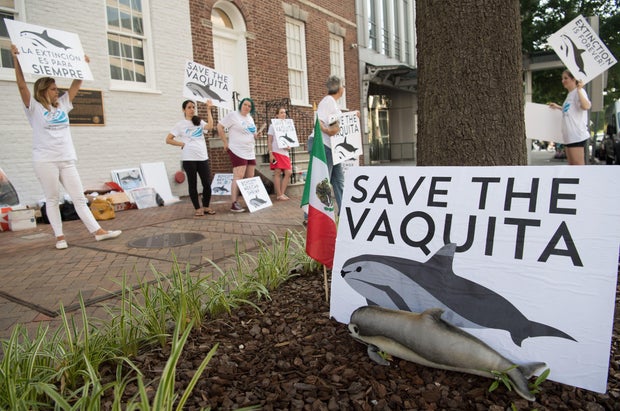CBS News
Expedition searching for world’s most endangered marine mammal reports dwindling population

The number of Mexico’s critically endangered vaquita marina porpoises sighted in the Gulf of California fell to between 6 and 8 this year, researchers said Tuesday, though it’s possible that some of the creatures may have moved elsewhere in the Gulf, the only place in the world where they live.
Vaquitas are the world’s smallest porpoise and the most endangered marine mammal on the planet.
Last year, experts on a sighting expedition estimated they saw from 10 to 13 of the tiny, shy, elusive porpoises during nearly two weeks of sailing in the Gulf, also known as the Sea of Cortez.
But this year, the conservation group Sea Shepherd said a similar expedition conducted during three weeks in May sighted only about a half dozen, though the search was not as extensive as last year’s. More troubling, no baby vaquitas were seen this year.
“Unlike 2023, no recently born calves were seen, but a healthy juvenile was seen,” Sea Shepherd said in a statement.
However, about half the sightings last year occurred outside and just west of the vaquitas’ exclusive protection zone, a heavily patrolled area in the Gulf where all fishing is prohibited, though some still occurs illegally.
Paula Olson/NOAA
Experts aren’t exactly sure why vaquitas might like the area just outside the protected zone, but this year’s expedition concentrated on areas inside the zone.
Because they are so small and elusive, many times the vaquitas can only be seen from far away through powerful binoculars, and so such sightings are categorized as probable or likely. Thus, the numbers are expressed in probable “ranges” of the real figure.
The mammals also emit “clicks” that can be heard through acoustic monitoring devices.
“While these results are worrying, the area surveyed represents only 12% of the total area where vaquitas were observed in 2015,” said Dr. Barbara Taylor, the researcher who led the study. “Since vaquitas move freely within the vaquita refuge, we must extend the survey using acoustic detection to determine where the vaquitas are going.”
There are plans to do just that. But according to the previous report, “fishermen have begun removing the acoustic devices (CPODs) used to record vaquita clicks. The data recorded on each device is lost, and it is expensive to replace the stolen CPODs.”
“Unless enforcement of the fishing ban is effective and the theft of equipment is stopped, acoustic monitoring cannot collect data as it has in the past,” the report stated.
A species at risk
Last year’s report had raised hopes for the species, which lives nowhere else and cannot be captured, held or bred in captivity. An attempt was made in 2018 to capture some vaquitas and help them breed in captivity, but the first porpoise captured was “just too stressed from the experience” and had to be released, CBS News previously reported.
This year’s report was another piece of continued bad news for the species. Illegal gillnets have trapped and killed vaquitas for decades; the reported population has declined from nearly 600 vaquitas in 1997.
Fishermen set the nets to catch totoaba, a fish whose swim bladder is considered a delicacy in China and can fetch thousands of dollars per pound. The size of the nets is about the same size as a vaquita’s head, CBS News reported, making it easy for them to become ensnared in the mesh.
While the Mexican government has made some efforts to stop the net fishing — like sinking concrete blocks with hooks to snag nets in the protected zone — the fishermen still appear to have the upper hand, setting illegal nets regularly and even sabotaging monitoring efforts.
Alex Olivera, the Mexico representative for the Center for Biological Diversity, said “vaquitas reproduce so slowly that recovery is impossible without help, and their very survival remains in grave doubt.”
SAUL LOEB
“Vaquitas face a serious threat of extinction from dangerous gillnets in their habitat and the Mexican government’s lax enforcement of protective regulations,” Olivera said, noting “it’s crucial” that enforcement be stepped up now.
Olivera, who was not part of the expedition, previously estimated that “even in a gillnet-free habitat, it will take about 50 years for the population to return to where it was 15 years ago.”
A scientist told CBS News in 2018 that removing gillnets could help protect the species.
“If we can absolutely ensure that these underwater gillnets are not in a place where the remaining animals are, they would survive,” the scientist explained. “They just need a chance.”
President Andrés Manuel López Obrador’s administration has largely declined to spend money to compensate fishermen for staying out of the vaquita refuge and stop using gillnets, or monitor their presence or the areas they launch from.
Sea Shepherd has been working in the Gulf alongside the Mexican Navy to discourage illegal fishing in the protected area. The government’s protection efforts have been uneven, at best, and also often face violent opposition from local fishermen.
CBS News
The Pager Plot | Sunday on 60 Minutes

Watch CBS News
Be the first to know
Get browser notifications for breaking news, live events, and exclusive reporting.
CBS News
Mega Millions jackpot soars to $862 million for Friday night’s drawing

There’s still time to become a mega-millionaire for Christmas, but lady luck will have to be on your side.
No one matched Mega Millions‘ all six winning numbers last Tuesday, and the jackpot now stands at $862 million ahead of Friday night’s drawing.
The jackpot has been rolling since it was last won at $810 million in Texas on Sept. 10.
If there is a sole winner, they have a choice between an annuity, with an initial payment and then 29 annual payments, or a one-time lump sum payment. Most winners choose a cash payout.
For Friday night’s drawing, that would be an estimated $392.1 million before taxes.
If won at that level, it would be the largest prize ever won in December and the seventh largest in Mega Millions history.
According to Mega Millions, 13 jackpots have been won during December since the game began in 2002. Three were won in the days after Christmas, while the other 10 were won before Christmas. There has never been a jackpot win on Christmas Day, although over the years drawings have been conducted on Christmas six times – in 2007, 2009, 2012, 2015, 2018 and 2020.
Mega Millions drawings are held on Tuesday and Friday, tickets cost $2. The odds of winning the jackpot are about 1 in 303 million.
CBS News
IRS sending payments of up to $1,400 to 1 million people. Here’s who qualifies.

The IRS said Friday it is sending a total of $2.4 billion in “special payments” to 1 million people, part of an effort to ensure that Americans who didn’t receive all of their federal stimulus checks during the pandemic will get the money in their bank accounts.
The payments will vary by person, with a maximum amount of $1,400 per recipient, the agency said in a statement.
“To minimize headaches and get this money to eligible taxpayers, we’re making these payments automatic, meaning these people will not be required to go through the extensive process of filing an amended return to receive it,” IRS Commissioner Danny Werfel said in a statement.
Who will get a payment from the IRS?
The tax agency said it’s disbursing the funds after reviewing internal data that showed many people had filed tax returns but yet didn’t claim what is known as the “recovery rebate credit” in 2021.
That credit was designed for people who didn’t get all or some of the stimulus checks when they were issued during the pandemic. Lawmakers authorized three stimulus payments, with two sent in 2020 and a third in 2021.
Most taxpayers who were eligible for the stimulus payments have already received them directly, or later through the recovery rebate credit.
Do you need to apply for the IRS payment?
No. The IRS said it’s sending the payments automatically to about 1 million people who filed tax returns and who qualified for the recovery rebate credit yet didn’t claim it. The agency will send a letter to recipients to let them know they will receive the payment.
When will the IRS send the payments?
The tax agency said the checks will be sent in December, with most of the payments arriving by late January 2025.
The money will either be automatically direct deposited to the recipient’s bank account or will arrive in the mail via a paper check.










